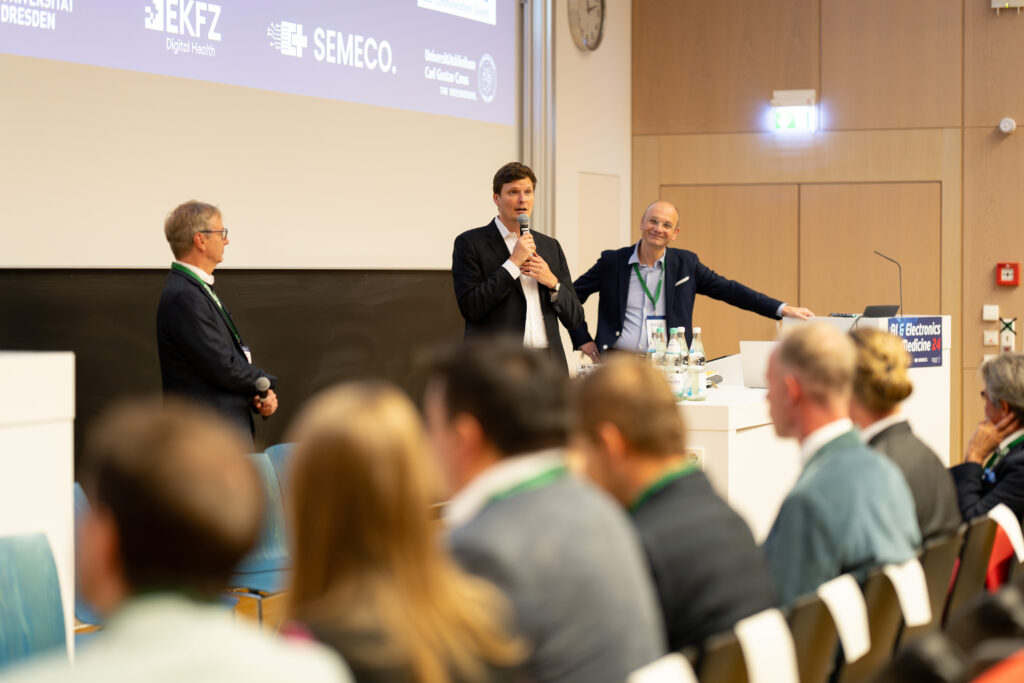Saxon State Minister Conrad Clemens opened the “AI and Electronics for Medicine” conference in Dresden on September 12, 2024. The approximately 300 participants can look forward to an extensive program of lectures, discussion panels and an exhibition with numerous demo stands and exhibits.

(c) UKD/Kirsten Lassig
In recent years, Dresden has gained substantial traction in the fields of digital health, health electronics and artificial intelligence (AI) in medicine. The Saxon state capital is now Europe’s leading site for microelectronics, communications technology and explainable AI. Both the Else Kröner Fresenius Center (EKFZ) for Digital Health and the SEMECO (Secure Medical Microsystems and Communications) future cluster are making an important contribution to this.
Prof. Gerhard Fettweis (Vodafone Chair for Mobile Communications Systems, TUD Dresden University of Technology):
Close cooperation and networking between the various disciplines is essential for Dresden as an excellent research site. We conduct cutting-edge research in the fields of microelectronics, AI for medicine and the approval of medical devices so that innovative developments can reach patient care faster. The future cluster SEMECO and the EKFZ for Digital Health want to increase the pace of innovation for smart medical instruments and implants together with many partners from science, business and industry.
Strong innovation site Dresden: Conference promotes multidisciplinary networking
The symposium offers the growing research community in Dresden and beyond a platform for interdisciplinary scientific exchange and networking with industry and business. On site, established MedTech and microelectronics companies will come together with academic and industrial research as well as aspiring local MedTech start-ups. In addition to project meetings of several large European and national research projects on medical AI, regulation, medical cloud and electronics, around 30 exhibitors will have the opportunity to present their research results, demonstrators and prototypes. In a total of six sessions, renowned speakers from science, business and industry will address topics relating to AI-supported analysis of clinical data, financing and investment, cybersecurity and approval of medical devices, wireless communication, semiconductors for medical devices and smart medical technology.
Conrad Clemens, State Minister and Head of the Saxon State Chancellery:
Saxony is Europe’s leading microelectronics site, driven by the close cooperation between research, science and industry. Saxon companies and institutes are also leading the way in AI, digital healthcare and medical technology research. I am delighted that EKFZ and SEMECO are hosting the conference on artificial intelligence and microelectronics in Dresden. A great opportunity for exchange and networking between research and industry!
Mario Brandenburg, Parliamentary State Secretary to the German Federal Minister of Education and Research:
The digital transformation in medical technology is key to improving healthcare for millions of people. At the same time, it offers great opportunities for future-oriented economic development. Close cooperation between science and industry is a major success factor here. The SEMECO future cluster is an outstanding example: interdisciplinary cooperation between medical technology, microelectronics and artificial intelligence is opening up new opportunities for technological innovation. Dresden, as the leading site for microelectronics in Europe, has excellent prerequisites with its renowned universities and dynamic corporate landscape. By driving forward the development and production of cutting-edge technologies, this innovative power also strengthens Germany’s technological sovereignty and reduces critical dependencies.
Further information on the “AI and Electronics for Medicine” conference: aiefm.de
